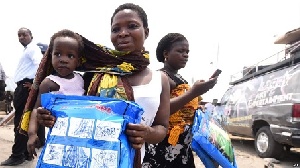 The distribution of the net is to replace those they shared three years ago (file photo)
The distribution of the net is to replace those they shared three years ago (file photo)
The Greater Accra Regional Health Directorate would from Tuesday, November 6, start registering residents, at the household level, for the distribution of Long Lasting Insecticidal Nets (LLIN) as part of efforts to eliminate malaria and its related socio-economic problems.
The seven-day exercise is expected to capture nearly 1.25 million households, with their heads being issued with coded-cards for the redemption of the nets from Thursday, November 22 to Wednesday, November 28.
The nets would, however, be distributed to only heads of households at designated points, which would be indicated on their cards, referred to as Point Mass Distribution.
Dr John B.K. Yabani, the acting Deputy Director of Public Health of the Greater Accra Region, who announced this at a regional stakeholders’ meeting, in Accra, appealed to heads of local government assemblies, Non Governmental Organisations, the media, private sector organisations, religious groups and other stakeholders to assist to make the programme successful.
He explained that the nets would replace those distributed three years ago since the insecticide loses potency after three years; or upon 20 washes.
It can, however, still serve as a physical barrier against the malaria vector.
Dr Yabani said significant progress has been made with the prevention, management and control of malaria over the years, while several monitoring and research reports had revealed that the LLIN was very effective.
He, therefore, warned against the misuse of the nets, such as for fishing and fencing of gardens, saying offenders should be reported.
The Greater Accra Region has not recorded any malarial-related death in pregnancy since 2014.
However, a total of 351,457 general Out-Patient Department (OPD) cases were recorded last year. The 2016 record for the Region was 366,523.
Throwing more light on the programme, Mrs Dorothy Abudey, the Regional Focal Person on Malaria Control, said the nets would be distributed under the policy of Universal Coverage of Sleeping in LLNT, which assigns one net to two persons in a household.
Studies conducted on field indicate that the maximum number of nets required by a household is five.
Mrs Abudey explained that the coded cards would bear the names of the heads of households, their contact numbers and the number of person in the household.
The programme, she said, was committed to building community ownership and ensuring bahavioural change through education and communication.
She emphasised that no nets would be given to those who would not register, while those who would lose their cards would have to wait until after the peak of the exercise to be verified, so that they would not interfere with the flow of the distribution process.
The nets would also be packaged in bags bearing the logo of the Ministry of Health, a not-for-sale-label and contact numbers for reporting incidents of misuse.
She urged beneficiaries to endeavour to hang them in the shade for 48 hours before use to prevent allergic reactions.
According to the Malaria Control and Elimination Partnership Project in Africa, Ghana loses 37.8 million dollars annually to malaria in household cost and health system treatment costs.
This, however, excludes those related to productivity loss and deaths.
The Global Fund, United States Agency for International Development and others are partnering the Ghana Health Service for the programme.